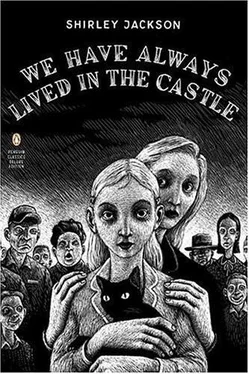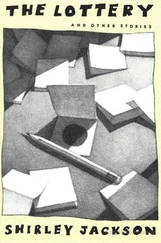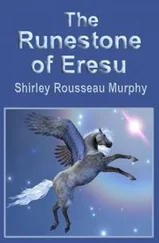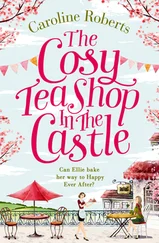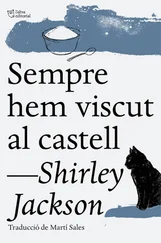Shirley Jackson - We Have Always Lived in the Castle
Здесь есть возможность читать онлайн «Shirley Jackson - We Have Always Lived in the Castle» весь текст электронной книги совершенно бесплатно (целиком полную версию без сокращений). В некоторых случаях можно слушать аудио, скачать через торрент в формате fb2 и присутствует краткое содержание. Город: New York, Год выпуска: 2006, ISBN: 2006, Издательство: Penguin Books, Жанр: Триллер, gothic_novel, на английском языке. Описание произведения, (предисловие) а так же отзывы посетителей доступны на портале библиотеки ЛибКат.
- Название:We Have Always Lived in the Castle
- Автор:
- Издательство:Penguin Books
- Жанр:
- Год:2006
- Город:New York
- ISBN:978-1-101-53065-8
- Рейтинг книги:3 / 5. Голосов: 1
-
Избранное:Добавить в избранное
- Отзывы:
-
Ваша оценка:
- 60
- 1
- 2
- 3
- 4
- 5
We Have Always Lived in the Castle: краткое содержание, описание и аннотация
Предлагаем к чтению аннотацию, описание, краткое содержание или предисловие (зависит от того, что написал сам автор книги «We Have Always Lived in the Castle»). Если вы не нашли необходимую информацию о книге — напишите в комментариях, мы постараемся отыскать её.
is a deliciously unsettling novel about a perverse, isolated, and possibly murderous family and the struggle that ensues when a cousin arrives at their estate.
We Have Always Lived in the Castle — читать онлайн бесплатно полную книгу (весь текст) целиком
Ниже представлен текст книги, разбитый по страницам. Система сохранения места последней прочитанной страницы, позволяет с удобством читать онлайн бесплатно книгу «We Have Always Lived in the Castle», без необходимости каждый раз заново искать на чём Вы остановились. Поставьте закладку, и сможете в любой момент перейти на страницу, на которой закончили чтение.
Интервал:
Закладка:
Anyone who came to see us, properly invited, came up the main drive which led straight from the gateposts on the highway up to our front door. When I was small I used to lie in my bedroom at the back of the house and imagine the driveway and the path as a crossroad meeting before our front door, and up and down the driveway went the good people, the clean and rich ones dressed in satin and lace, who came rightfully to visit, and back and forth along the path, sneaking and weaving and sidestepping servilely, went the people from the village. They can’t get in, I used to tell myself over and over, lying in my dark room with the trees patterned in shadow on the ceiling, they can’t ever get in any more; the path is closed forever. Sometimes I stood inside the fence, hidden by the bushes, and watched people walking on the highway to get from the village to the four corners. As far as I knew, no one from the village had ever tried to use the path since our father locked the gates.
When I had moved the shopping bag inside, I carefully locked the gate again, and tested the padlock to make sure it held. Once the padlock was securely fastened behind me I was safe. The path was dark, because once our father had given up any idea of putting his land to profitable use he had let the trees and bushes and small flowers grow as they chose, and except for one great meadow and the gardens our land was heavily wooded, and no one knew its secret ways but me. When I went along the path, going easily now because I was home, I knew each step and every turn. Constance could put names to all the growing things, but I was content to know them by their way and place of growing, and their unfailing offers of refuge. The only prints on the path were my own, going in and out to the village. Past the turn I might find a mark of Constance’s foot, because she sometimes came that far to wait for me, but most of Constance’s prints were in the garden and in the house. Today she had come to the end of the garden, and I saw her as soon as I came around the turn; she was standing with the house behind her, in the sunlight, and I ran to meet her.
“Merricat,” she said, smiling at me, “look how far I came today.”
“It’s too far,” I said. “First thing I know you’ll be following me into the village.”
“I might, at that,” she said.
Even though I knew she was teasing me I was chilled, but I laughed. “You wouldn’t like it much,” I told her. “Here, lazy, take some of these packages. Where’s my cat?”
“He went off chasing butterflies because you were late. Did you remember eggs? I forgot to tell you.”
“Of course. Let’s have lunch on the lawn.”
When I was small I thought Constance was a fairy princess. I used to try to draw her picture, with long golden hair and eyes as blue as the crayon could make them, and a bright pink spot on either cheek; the pictures always surprised me, because she did look like that; even at the worst time she was pink and white and golden, and nothing had ever seemed to dim the brightness of her. She was the most precious person in my world, always. I followed her across the soft grass, past the flowers she tended, into our house, and Jonas, my cat, came out of the flowers and followed me.
Constance waited inside the tall front door while I came up the steps behind her, and then I put my packages down on the table in the hall and locked the door. We would not use it again until afternoon, because almost all of our life was lived toward the back of the house, on the lawn and the garden where no one else ever came. We left the front of the house turned toward the highway and the village, and went our own ways behind its stern, unwelcoming face. Although we kept the house well, the rooms we used together were the back ones, the kitchen and the back bedrooms and the little warm room off the kitchen where Uncle Julian lived; outside was Constance’s chestnut tree and the wide, lovely reach of lawn and Constance’s flowers and then, beyond, the vegetable garden Constance tended and, past that, the trees which shaded the creek. When we sat on the back lawn no one could see us from anywhere.
I remembered that I was to be kinder to Uncle Julian when I saw him sitting at his great old desk in the kitchen corner playing with his papers. “Will you let Uncle Julian have peanut brittle?” I asked Constance.
“After his lunch,” Constance said. She took the groceries carefully from the bags; food of any kind was precious to Constance, and she always touched foodstuffs with quiet respect. I was not allowed to help; I was not allowed to prepare food, nor was I allowed to gather mushrooms, although I sometimes carried vegetables in from the garden, or apples from the old trees. “We’ll have muffins,” Constance said, almost singing because she was sorting and putting away the food. “Uncle Julian will have an egg, done soft and buttery, and a muffin and a little pudding.”
“Pap,” said Uncle Julian.
“Merricat will have something lean and rich and salty.”
“Jonas will catch me a mouse,” I said to my cat on my knee.
“I’m always so happy when you come home from the village,” Constance said; she stopped to look and smile at me. “Partly because you bring home food, of course. But partly because I miss you.”
“I’m always happy to get home from the village,” I told her.
“Was it very bad?” She touched my cheek quickly with one finger.
“You don’t want to know about it.”
“Someday I’ll go.” It was the second time she had spoken of going outside, and I was chilled.
“Constance,” Uncle Julian said. He lifted a small scrap of paper from his desk and studied it, frowning. “I do not seem to have any information on whether your father took his cigar in the garden as usual that morning.”
“I’m sure he did,” Constance said. “That cat’s been fishing in the creek,” she told me. “He came in all mud.” She folded the grocery bag and put it with the others in the drawer, and set the library books on the shelf where they were going to stay forever. Jonas and I were expected to stay in our corner, out of the way, while Constance worked in the kitchen, and it was a joy to watch her, moving beautifully in the sunlight, touching foods so softly. “It’s Helen Clarke’s day,” I said. “Are you frightened?”
She turned to smile at me. “Not a bit,” she said. “I’m getting better all the time, I think. And today I’m going to make little rum cakes.”
“And Helen Clarke will scream and gobble them.”
Even now, Constance and I still saw some small society, visiting acquaintances who drove up the driveway to call. Helen Clarke took her tea with us on Fridays, and Mrs. Shepherd or Mrs. Rice or old Mrs. Crowley stopped by occasionally on a Sunday after church to tell us we would have enjoyed the sermon. They came dutifully, although we never returned their calls, and stayed a proper few minutes and sometimes brought flowers from their gardens, or books, or a song that Constance might care to try over on her harp; they spoke politely and with little runs of laughter, and never failed to invite us to their houses although they knew we would never come. They were civil to Uncle Julian, and patient with his talk, they offered to take us for drives in their cars, they referred to themselves as our friends. Constance and I always spoke well of them to each other, because they believed that their visits brought us pleasure. They never walked on the path. If Constance offered them a cutting from a rosebush, or invited them to see a happy new arrangement of colors, they went into the garden, but they never offered to step beyond their defined areas; they walked along the garden and got into their cars by the front door and drove away down the driveway and out through the big gates. Several times Mr. and Mrs. Carrington had come to see how we were getting along, because Mr. Carrington had been a very good friend of our father’s. They never came inside or took any refreshment, but they drove to the front steps and sat in their car and talked for a few minutes. “How are you getting along?” they always asked, looking from Constance to me and back; “how are you managing all by yourselves? Is there anything you need, anything we can do? How are you getting along?” Constance always invited them in, because we had been brought up to believe that it was discourteous to keep guests talking outside, but the Carringtons never came into the house. “I wonder,” I said, thinking about them, “whether the Carringtons would bring me a horse if I asked them. I could ride it in the long meadow.”
Читать дальшеИнтервал:
Закладка:
Похожие книги на «We Have Always Lived in the Castle»
Представляем Вашему вниманию похожие книги на «We Have Always Lived in the Castle» списком для выбора. Мы отобрали схожую по названию и смыслу литературу в надежде предоставить читателям больше вариантов отыскать новые, интересные, ещё непрочитанные произведения.
Обсуждение, отзывы о книге «We Have Always Lived in the Castle» и просто собственные мнения читателей. Оставьте ваши комментарии, напишите, что Вы думаете о произведении, его смысле или главных героях. Укажите что конкретно понравилось, а что нет, и почему Вы так считаете.
